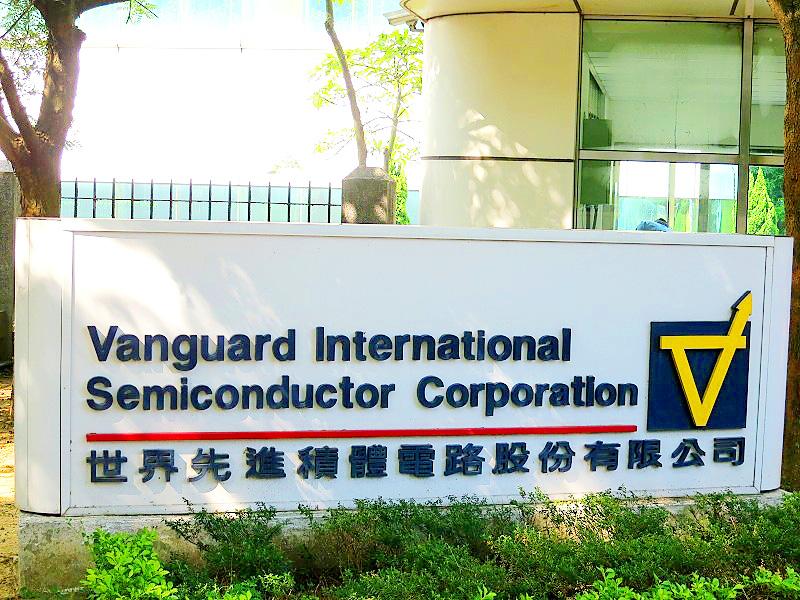Vanguard International Semiconductor Corp (世界先進), a supplier of display driver ICs and power management chips, expects its revenue next year to surpass the 12 percent annual rate estimated for the global foundry sector, driven by robust demand for chips used in electric vehicles (EVs) and 5G smartphones.
To manage rising chip demand, Vanguard increased its capital expenditure for this year to between NT$8.5 billion and NT$9 billion (US$305.21 million and US$323.16 million), from NT$8.5 billion estimated three months ago.
The expenditure increase would boost capacity slightly this year and about 8 percent next year, it said.

Photo: Grace Hung, Taipei Times
The chipmaker is considering investing in a new 12-inch fab, it said, adding that a small percentage of the chips that are being made at 8-inch fabs would be produced at 12-inch fabs in the next few years because of cost efficiency.
Vanguard operates four 8-inch fabs and is constructing a fifth one.
“Overall, our customers continue to show robust demand for our foundry services. With our current order visibility, we expect factory utilization to remain high throughout the first half of 2022,” Vanguard chairman Fang Leuh (方略) told an investors’ teleconference.
“We hold a positive outlook on next year,” Fang said. “We will outperform the estimated growth in the global foundry sector thanks to growth momentum coming from all segments.”
IC Insights forecast that the global foundry sector would see compound annual growth of 12.2 percent in the five-year period to 2025.
EVs and 5G smartphones are to be the main growth drivers, Vanguard said, due to higher market penetration and the higher number of semiconductors needed.
Replacement demand would also fuel robust demand for commercial laptops next year, the chipmaker said.
Growth momentum this quarter continues to be robust, Vanguard said, adding that growth did not slacken when it shifted to supply driver ICs for high-resolution 4K and 8K TV panels from low-end 50-inch TV panels.
Revenue this quarter is expected to increase 2.56 to 6.93 percent to between NT$12.3 billion and NT$12.7 billion, which would be another record quarter, Fang said.
Gross margin this quarter is expected to be 45.5 to 47.5 percent, compared with 45.8 percent last quarter, the company said.
Vanguard expects shipments of driver ICs used in mobile phones and other consumer electronics panels to show sequential growth this quarter.
Net profit in the three months to September increased to a record NT$3.29 billion, more than doubling the NT$1.53 billion of a year earlier and representing quarterly growth of 26.4 percent from NT$2.6 billion.
Earnings per share last quarter rose to NT$1.99, up from NT$0.93 a year earlier and NT$1.53 in the prior quarter.

SMART MANUFACTURING: The company aims to have its production close to the market end, but attracting investment is still a challenge, the firm’s president said Delta Electronics Inc (台達電) yesterday said its long-term global production plan would stay unchanged amid geopolitical and tariff policy uncertainties, citing its diversified global deployment. With operations in Taiwan, Thailand, China, India, Europe and the US, Delta follows a “produce at the market end” strategy and bases its production on customer demand, with major site plans unchanged, Delta president Simon Chang (張訓海) said on the sidelines of a company event yesterday. Thailand would remain Delta’s second headquarters, as stated in its first-quarter earnings conference, with its plant there adopting a full smart manufacturing system, Chang said. Thailand is the firm’s second-largest overseas

‘REMARKABLE SHOWING’: The economy likely grew 5 percent in the first half of the year, although it would likely taper off significantly, TIER economist Gordon Sun said The Taiwan Institute of Economic Research (TIER) yesterday raised Taiwan’s GDP growth forecast for this year to 3.02 percent, citing robust export-driven expansion in the first half that is likely to give way to a notable slowdown later in the year as the front-loading of global shipments fades. The revised projection marks an upward adjustment of 0.11 percentage points from April’s estimate, driven by a surge in exports and corporate inventory buildup ahead of possible US tariff hikes, TIER economist Gordon Sun (孫明德) told a news conference in Taipei. Taiwan’s economy likely grew more than 5 percent in the first six months

SUPPLY RESILIENCE: The extra expense would be worth it, as the US firm is diversifying chip sourcing to avert disruptions similar to the one during the pandemic, the CEO said Advanced Micro Devices Inc (AMD) chief executive officer Lisa Su (蘇姿丰) on Wednesday said that the chips her company gets from supplier Taiwan Semiconductor Manufacturing Co (TSMC, 台積電) would cost more when they are produced in TSMC’s Arizona facilities. Compared with similar parts from factories in Taiwan, the US chips would be “more than 5 percent, but less than 20 percent” in terms of higher costs, she said at an artificial intelligence (AI) event in Washington. AMD expects its first chips from TSMC’s Arizona facilities by the end of the year, Su said. The extra expense is worth it, because the company is

The seizure of one of the largest known mercury shipments in history, moving from mines in Mexico to illegal Amazon gold mining zones, exposes the wide use of the toxic metal in the rainforest, according to authorities. Peru’s customs agency, SUNAT, found 4 tonnes of illegal mercury in Lima’s port district of Callao, according to a report by the non-profit Environmental Investigations Agency (EIA). “This SUNAT intervention has prevented this chemical from having a serious impact on people’s health and the environment, as can be seen in several areas of the country devastated by the illegal use of mercury and illicit activities,”